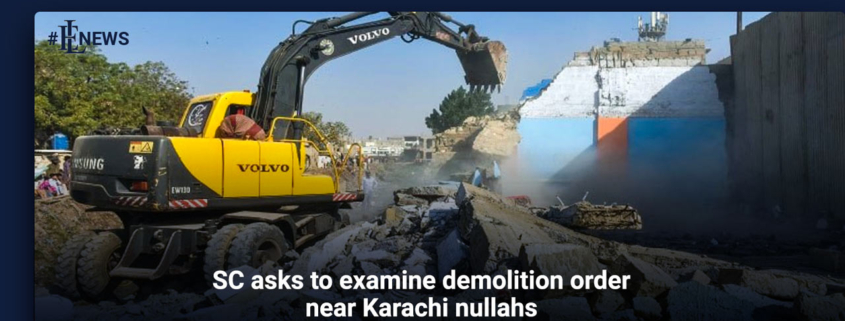SC asks to examine demolition order near Karachi nullahs
SC asks to examine demolition order near Karachi nullahs. According to a petition filed on Monday, the Supreme Court should convene a full court comprised of all existing judges to review its June 14 directive directing the Sindh government to clear both sides of Karachi’s Gujjar and Orangi nullahs of human settlements. This directive resulted in the displacement of over 50,000 people on both sides of the nullahs.
The request was made as part of a group of four similar applications, which counsel Faisal Siddiqui filed on behalf of an individual named Naimutallah Khan, the Pakistan Railway Employees Cooperative Housing Society, the management of Alladin Park, and several Karachi Development Authority officials, among others (KDA).
Applicants from across the country have petitioned Chief Justice of Pakistan Gulzar Ahmed to consider forming a larger Supreme Court bench to hear their cases.
The Pakistan Railway Employees Cooperative Housing Society applied because the directive questioned the legality of a piece of land that the federal government had granted the society to build on.
The application argued that the Supreme Court had adjudicated on and upheld the legality of the applicant’s lease, title, and possession of railway land in a decision delivered on November 11, 1991. Therefore, the applicant was entitled to the benefit of that decision. SC asked to reconsider demolition order near Karachi nullahs.
‘Controversial and fundamental questions’
Specifically, the petition stated “fundamental and complex questions” of constitutional and legal significance at stake. One of the questions is: what were the jurisdictional and procedural parameters (scope, powers, limitations, rights, and duties) in exercising jurisdiction under Article 184 (3) of the Constitution? Another question is: what were the jurisdictional and procedural parameters (scope, powers, limitations, rights, and duties) in the exercise of jurisdiction under the Constitution?
Two questions remain: Is there any standard by which judges should organize their judicial discretion when deciding which cases of public importance involving the enforcement of fundamental rights under Article 184 are to be considered? (3). In the exercise of jurisdiction under Article 184(3), what are the parameters and rights of affected parties, as well as the extent of their due process rights, and what is the scope of the exercise of review jurisdiction under Article 188 of the Constitution?”
Read more with EL news : The Chinese government will shortly begin partial payments
Thousands of houses and buildings have been demolished due to the June 14 order, displacing more than 50,000 people who have not received any immediate compensation or rehabilitation, according to the petition filed by Naimutallah Khan.
After the Gujjar and Orangi nullahs were cleaned, the Supreme Court ordered the construction of 30-foot-wide roads on both sides of the nullahs, approved by the Supreme Court earlier this year.
According to the petition, the court should overturn its June 14 order directing the Sindh government, the National Disaster Management Authority (NDMA), and Karachi’s Administrator to ensure that all lands on both sides of the Gujjar and Orangi nullahs, along with the right of way, were cleared of mud and debris. SC asked to reconsider demolition order near Karachi nullahs.
A valid leaseholder’s petition to the Supreme Court asserted that the applicants named in the petition were legitimate leaseholders who had approached the apex court to ensure that they were treated fairly under the law.
The petition argued that the June 14 order was silent on whether the government could conduct demolitions to build roads on both sides of the Gujjar and Orangi nullahs, which the petition claimed violated the Constitution. SC asked to reconsider demolition order near Karachi nullahs.
The petition argued that the Supreme Court had not ordered the government to demolish any houses or buildings at the two locations in a decision issued on August 12, 2016, delivered on August 12, 2016.
They claimed that the court’s silence on the matter has allowed the authorities to proceed with demolitions without disclosing any plan compliant with the laws in force.
In light of the Constitution’s fundamental rights guaranteed by Articles 23 and 24, one could acquire no property through demolition to build a road, except for land acquired under the Land Acquisition Act of 1894, passed in 1894.
In other words, the petition for judicial review argued that the June 14 order contains errors that are both obvious and floating on the surface of the record. SC asked to reconsider demolition order near Karachi nullahs.
The order, according to the petition, was based on presumptions that had not been proven. Concerning the clearance of land for both Gujjar and Orangi nullahs and their right of way, these “unverified presumptions” are a general order that makes no specific finding or determination as to the length and breadth of such nullahs and their right of way. SC asked to reconsider demolition order near Karachi nullahs.
This determination was critical because, without an accurate mapping of the dimensions of the two nullahs, it was impossible to issue a general order for the wholesale demolition of houses and buildings in the two nullahs.
To put it another way, only those structures could be demolished that were encroaching on the nullahs’ territory, according to the petition. SC asked to reconsider demolition order near Karachi nullahs.
Keep up with Estate Land Marketing for news and updates.




Leave a Reply
Want to join the discussion?Feel free to contribute!